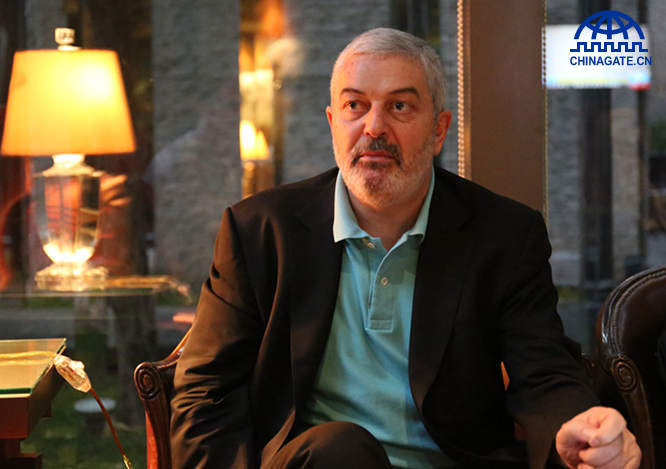UNDP: China is joining the world leadership to combat climate change
chinagate.cn by Qi Yibin, November 26, 2015 Adjust font size:

Chinagate.cn had an exclusive interview with Mr.Magdy Martínez-Solimán, Assistant Administrator and Director of the Bureau for Policy and Programme Support for the United Nations Development Program (UNDP), ahead of the Paris climate change conference.
Chinagate.cn:
Despite increasing warning signs for more than two decades about the environmental risks of rising greenhouse gas emissions, most governments have seemed powerless to change course. A new report by the WMO revealed that greenhouse gas concentrations in 2014 hit a new high again. How can we balance economic growth and climate change?
Martínez-Solimán:
I’d like to dispute the premise that governments are powerless. The problem is that dirty growth is cheaper and faster than green growth. And green growth requires a complete transformation of economic drivers that some political leaders are simply not ready or do not have the courage to push forward. But many governments, and many public opinions, media outlets and communicators, certainly scientists, have pressed forward precisely the idea and this report of the WMO, which is one example of how the awareness about the gravity of the situation and the importance of redressing current policies, for instance, fossil fuel subsidies, is having in today’s economic decisions. So, I think that we have a movement of political decisions, technology progress, public opinion awareness, social pressure, and the persuasion of mere facts that we live by every day. If you analyze the number of premature deaths in China that are due to air pollution and water pollution, you realize that actually the type of economic growth that we are witnessing is not sustainable. That is why the agenda has been an Agenda of Sustainable Development Goals. That is why the climate talks are arriving at such a sort of critical movement in Paris. But again, what I think is the essential message is that governments are more and more aware and willing to do more and to agree on a change of course. And I think among those governments, the government of China is clearly joining the world leadership which realizes that we are on a collision course with our own planet.
Chinagate.cn:
A recent report by UNEP noted that the current INDCs of nations submitted to the UNFCCC is not ambitious enough to achieve the goal of keeping the temperature rise under 2 degrees. How can we further boost emissions reduction?
Martínez-Solimán:
I just participated in the conferences of all the INDCs in Rabat, Morocco. And I have seen that the last INDC that has been submitted, which I think is the INDC of Sudan, is number 140, I want to say 145. The first thing I want to say is that we need to appreciate the enormous efforts that countries have done in producing the INDCs in the first place. The INDCs are the bed rock of the national action plans that will then implement whatever agreement comes from Paris. So, first message, appreciation for the importance that these INDCs have. It’s not a small effort. Now, when you aggregate the impact of reduction of the INDCs, it’s true that we are not below 2 degrees. And therefore, you are correct in your question saying more ambition is needed. This is a very difficult discussion because, yes, it needs to add up, but who needs to make the effort? Obviously, the largest polluters are the first ones people are looking at. So, people are looking at the producers of oil, the very large economies, the United States, China and the Europeans. They are looking at the major sources of greenhouse gas emissions. And therefore, the decisions that will be taken in Paris will be extremely important.
Paris is the key to a higher level of ambition. We continue to advocate for a 2-degree legally binding commitment in Paris. Scientists are even saying that with 2 degrees we may not obtain the objectives we are looking at. They’re saying that even at 2 degrees, it might be a curve that goes too high in what we’re intending terms of preservation of the glaciers, in terms of preservation of biodiversity, and in terms of manageable climate change on the planet. But for now, let us first take stock of the INDCs, which are a good effort. Let us try and be more ambitious in Paris, which could be a good outcome. And then, I think we need to analyze this like a marathon, not like a sprint to Paris. This is a marathon where every year you have a Cop. And we need to continue making efforts as scientists provide evidence of where we are arriving at. I think some work that is ongoing in terms of a better mix of energy sources, increase of renewables, serious work in terms of the green design of buildings, better urban transformation and planning, smarter agriculture, and a more rational use of water. We need more modern technology for the control of emissions of the industry. Many measures are underway that make it possible to obtain results at the national level, and we will be working with governments on those levels.